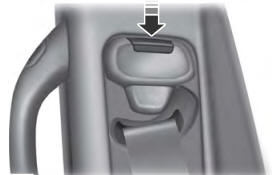Ford Explorer: Exhaust System - 2.3L EcoBoost (201kW/273PS) / Removal and Installation - Downstream Catalytic Converter
Ford Explorer 2020-2025 Service Manual / Powertrain / Exhaust System / Exhaust System - 2.3L EcoBoost (201kW/273PS) / Removal and Installation - Downstream Catalytic Converter
Removal
NOTE: Removal steps in this procedure may contain installation details.
-
Refer to: Health and Safety Precautions (100-00 General Information, Description and Operation).
-
With the vehicle in NEUTRAL, position it on a hoist.
Refer to: Jacking and Lifting (100-02 Jacking and Lifting - 2.3L EcoBoost (201kW/273PS)) .
-
Remove and discard the nuts.
Torque: 30 lb.ft (40 Nm)
.jpg) |
-
Loosen the exhaust clamp.
Torque: 41 lb.ft (55 Nm)
.jpg) |
-
Remove the isolator hanger bracket bolts and the muffler inlet pipe.
Torque: 177 lb.in (20 Nm)
.jpg) |
-
-
Remove and discard the gasket.
-
Clean and inspect the gasket surface.
-
Remove and discard the gasket.
.jpg) |
Installation
-
NOTE: Make sure that a new gasket and the nuts are installed.
To install, reverse removal procedure.
-
Clean all exhaust connections before reassembly.
-
Check the exhaust system for leaks.
 Removal and Installation - Catalytic Converter
Removal and Installation - Catalytic Converter
Removal
WARNING:
When the engine and exhaust system are hot, they can cause
severe burns or injury. Turn off the engine and wait until they are cool
before removing the exhaust system...
 Removal and Installation - Muffler and Tailpipe
Removal and Installation - Muffler and Tailpipe
Removal
NOTE:
Removal steps in this procedure may contain installation details.
Refer to: Health and Safety Precautions (100-00 General Information, Description and Operation)...
Other information:
Ford Explorer 2020-2025 Service Manual: Removal and Installation - Front Strut and Spring Assembly
Removal NOTICE: Suspension fasteners are critical parts that affect performance of vital components and systems. Failure of these fasteners may result in major service expense. Use the same or equivalent parts if replacement is necessary. Do not use a replacement part of lesser quality or substitute design...
Ford Explorer 2020-2025 Service Manual: General Procedures - Evaporator Core Leak Check - Vehicles With: R1234YF Refrigerant
Special Tool(s) / General Equipment Air Conditioning Service Unit Air Conditioning Adaptor Kit Inspection Recover the refrigerant. Refer to Air Conditioning (A/C) System Recovery, Evacuation and Charging procedure in Group 412...
Categories
- Manuals Home
- 6th Generation Explorer Owners Manual
- 6th Generation Explorer Service Manual
- Engine
- Auxiliary Power Points
- Removal and Installation - Front Halfshaft Speed Sensor
- New on site
- Most important about car
Seatbelt Height Adjustment
WARNING: Position the seatbelt height adjuster so that the seatbelt rests across the middle of your shoulder. Failure to adjust the seatbelt correctly could reduce its effectiveness and increase the risk of injury in a crash.

Copyright © 2025 www.foexplorer.com
